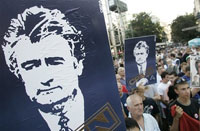Karadzic declines court-appointed attorney offer
The world gets its first look Thursday at former Bosnian Serb leader Radovan Karadzic, shorn of the bushy beard and long hair that disguised him as a new age guru during at least part of his nearly 13 years as a fugitive from genocide charges.

Karadzic appears before Dutch judge Alphons Orie at the Yugoslav war crimes tribunal, the first step in a legal process that could take several years.
From prison, Karadzic told court officials he would represent himself at the initial hearing Thursday and declined the offer of a court-appointed attorney.
He will be asked to enter pleas on 11 charges of genocide, crimes against humanity and war crimes for allegedly masterminding atrocities throughout Bosnia's 1992-95 war. Prosecutors say he was responsible for the 1995 Srebrenica massacre of some 8,000 Bosnian Muslim men and boys, the deadly 44-month siege of Sarajevo and the establishment of a network of internment camps where non-Serbs were routinely tortured, raped and murdered.
Marco Gerritsen, lawyer for a group called "The Mothers of Srebrenica," said survivors of Europe's worst mass murder since World War II have mixed feelings about Karadzic's arrest.
"First, of course they are happy because it is a great step towards justice," he said. "On the other hand, there are still some other people at large, like Ratko Mladic."
Mladic, Karadzic's military chief during the war, is one of only two remaining fugitives indicted by the tribunal. The other is Goran Hadzic, a Croatian Serb leader.
If convicted, 63-year-old Karadzic faces a maximum sentence of life imprisonment.
It is the first public appearance for Karadzic since his arrest July 21 on a Belgrade bus. At the time, he was virtually unrecognizable, his face hidden behind a heavy white beard.
A photo reportedly taken while he was in custody in Belgrade and published in Serbian newspaper Blic shows Karadzic with a shave and haircut reverting to a tame swept-back style, but which is closer to his trademark look when he was the urbane face of a monstrous regime. The years since the Bosnian conflict ended has turned his hair from salt and pepper to silvery gray.
At Thursday's hearing in a packed courtroom, Orie will ask Karadzic to confirm his identity and give him a chance to comment on his conditions of detention. Then he will offer to read Karadzic his 11-count indictment and ask him if he wishes to enter pleas to the charges.
However, Orie will try to rein in any other statements by Karadzic.
"This is not a trial, this is his initial appearance," court spokeswoman Nerma Jelacic said.
Karadzic's Belgrade-based lawyer has said Karadzic plans to ask for the maximum 30 days before entering a plea to the charges. If he fails to plead within that time, Orie will enter not-guilty pleas on all counts.
For Srebrenica survivors, just seeing Karadzic in court will be painful.
"Old wounds get opened and they are confronted with the things that happened in 1995," Gerritsen said.
Karadzic's arrival in the Netherlands on Wednesday aboard a Serbian government business jet marked the end of a 13-year effort by the Yugoslav war crimes tribunal to get hold of its most wanted war crimes suspect.
Convicting him of genocide will be difficult, requiring proof of a deliberate intention to eradicate a specific ethnic group, in whole or in part.
Since the tribunal's inception in 1993, a genocide-related charge has held up through the appeals process only once, when Radislav Krstic was convicted of aiding and abetting genocide. The court has indicted 161 war crimes suspects - 27 of them are currently on trial and eight are appealing their convictions.
Judges are unlikely to find a smoking gun, such as written orders for Muslims and Croats to be wiped out, said professor Ton Zwaan of Amsterdam University's Center for Holocaust and Genocide Studies.
Speaking to reporters Wednesday, prosecutor Serge Brammertz conceded the case would not be easy, but said his team would draw on evidence already presented in other cases since Karadzic's original 1995 indictment. They are expected to update the indictment before the trial begins.
"We will ensure that it reflects the current case law, facts already established by the court and evidence collected over the past eight years," he said.
It will take months for both sides to prepare for the trial, Brammertz said.
Subscribe to Pravda.Ru Telegram channel, Facebook, RSS!




